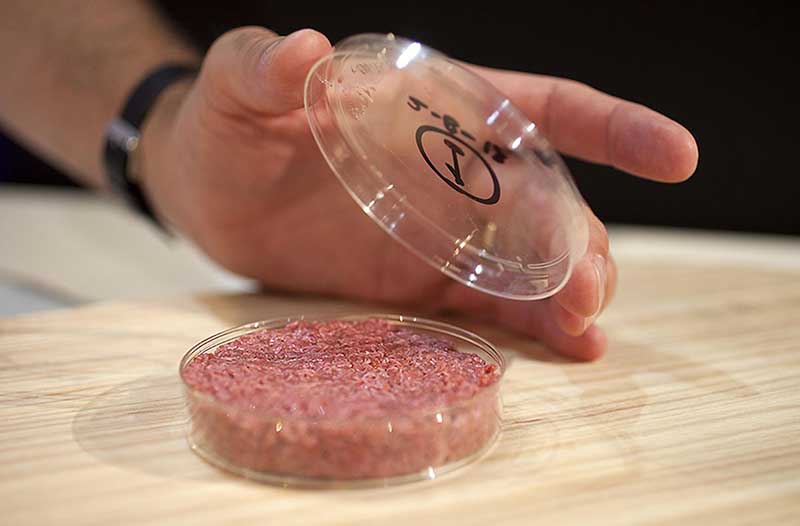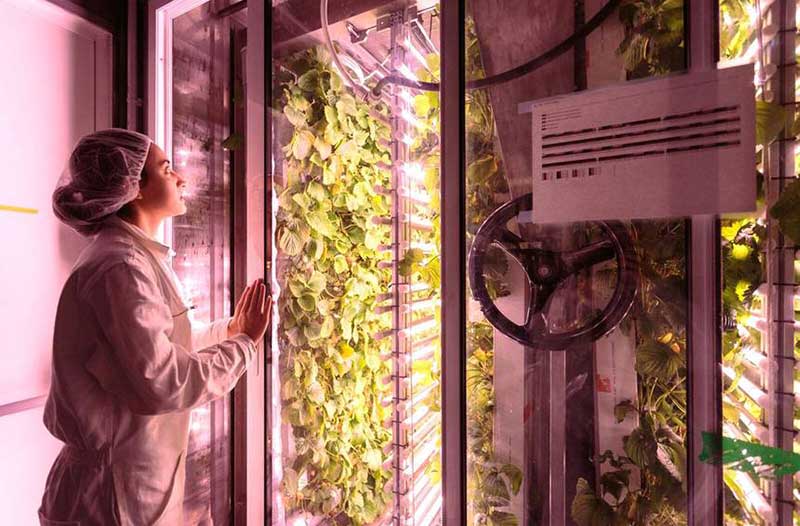- Are cows’ days really numbered?
- A new kind of weed in the Netherlands
- Healthy fruit made in containers
- The menus of the future will be different
The growth of the human population shows no signs of slowing down, and in around a decade, there’ll be one billion more mouths to feed. And as the demand for food increases, so does the pressure on farmers, forcing them to expand their farmlands and increase their livestock production. This will lead to the further degradation of those areas and an increase in greenhouse gas emissions, as modern agriculture is in no way environmentally friendly and it threatens the biodiversity and the survival of many animal species. Could technology help us develop more sustainable food production methods?
The idea of technology lending a much needed helping hand certainly appears to be gaining momentum, as the value of the sustainable food market is set to grow to $872.7 billion by 2020. A range of startups are developing technologies that could replace farmlands with containers, and animal meat and milk with lab-grown varieties. Furthermore, there are initiatives to introduce seaweed as an alternative, sustainable protein source. These disparate products all have a low ecological footprint, but their production needs to be scaled up so that they can enter the mass market. Investors are certainly optimistic, eagerly providing entrepreneurs with much-needed funds and backing their plans in a desperate attempt to save the planet – and make money while doing so.
Are cows’ days really numbered?
One of the pioneers in this field is the Dutch professor Mark Post from Maastricht University, who made a burger with lab-grown meat in 2013. Following the initial breakthrough, Post co-founded a new company, Mosa Meat, with the aim to commercialise his technology and bring clean meat, as he calls it, to restaurants and supermarkets across the world. The process of creating clean meat starts with taking stem cells, a type of ‘unspecialised’ cells that can either remain “a stem cell or become another type of cell with a more specialised function”, from the muscle of a cow and placing them in a bioreactor. Then, nutrients and growth factors are added to boost cell proliferation. And once it’s time to turn them into muscle cells, they’re placed in a gel that helps them form the shape of muscle fibres, which eventually becomes ‘meat’. This way, a single cell sample from a cow could potentially be used to produce enough meat for 80,000 burgers.

Investors loved the idea and supported Mosa Meat with €7.5 million to open up a factory in the Netherlands by 2021. While the price has come down considerably since their humble beginnings, an opportunity to eat tasty burgers while saving the planet still won’t come too cheap, as the cost of Mosa Meat patties is currently still projected at €8.50 each. Besides this, the European Food Safety Authority needs to carry out extensive tests before clean meat can hit the market, while consumers still “wonder if it’s really healthy”, Post admits. Nevertheless, he’s passionately convinced of its success. “There is no future for traditional meat and the end cannot come soon enough.”
Then there’s Perfect Day, a startup that wants to produce milk without cows. The company has accomplished it by programming a specific genetic code into yeast that then produces dairy proteins like casein and whey. Solina Chau, the founder of the investment firm Horizon Ventures, tasted this prototype milk and eventually approved a two million dollar investment in Perfect Day. Tim Geistlinger, the chief technology officer at this Silicon Valley-based startup, explains that they’ve already made yoghurt, cheese, and ice cream in their labs. And although not everyone is impressed by their idea, Geistlinger says that criticism only helps them to “think differently” by which we assume they mean ‘more creatively’.
A new kind of weed in the Netherlands
Creative thinking was also what prompted Jennifer Breaton, a co-founder of the Dutch startup Zeewaar, to spot the vast potential of seaweed. Several types of this increasingly popular ingredient are packed with protein, anti-oxidants, and minerals, earning it the title of ‘superfood’. They require no land or fresh water to grow, and help reduce the levels of heavy metals and CO2 in ocean water. And although seaweed has been used in Asian cuisine for centuries, it’s only now starting to make a splash in Europe thanks to entrepreneurs like Breaton, whose farm is already showing promising results.
The crops of royal kombu and sea lettuce – types of seaweed – that Zeewaar produces are used in a number of products like bath salts, tea, chocolate, falafel, mayonnaise, hot dogs, and meatless burgers. Mark Kulsdom, the founder of The Dutch Weed Burger, says that a seaweed burger has “more protein than meat, more calcium than milk, and it’s fatter than a fish”. The patties he makes are sold in over 200 cafes and restaurants across the Netherlands. The Amsterdam-based company Seamore also uses seaweed – sourced in Ireland and France – to produce pasta, wraps, and even ‘bacon’.
Healthy fruit made in containers
The tasty menus of the future wouldn’t be complete without sustainably produced fruit and vegetables. The French startup Agricool is aiming exactly at this market with its 12-metre-long and 2.5-metre-wide containers for growing strawberries. The containers are equipped with vertical towers along which the fruit can grow, as well as low-power LEDs. In these tech-rich metal boxes, it’s possible to produce seven tons of strawberries a year with little water and a low carbon output. Also, the company doesn’t use any pesticides and plans to produce a variety of plants in the future. And while this type of setup isn’t (yet) going to be able to feed entire cities, they’re a sign that startups are increasingly interested in solving the mounting problems of today’s unsustainable agricultural practices.

The menus of the future will be different
As traditional food production harms the environment, entrepreneurs are stepping forward with a set of creative solutions. From cruelty-free meat and cow-free milk to seaweed burgers and container-made fruits, the menus of the future will in many ways be different from what most people are used to eat. New types of food will hopefully contribute to the decrease in our carbon footprint and the protection of our forests and fertile land. The mass adoption of this new type of cuisine will however greatly depend on its taste and affordability as well, but startups are convinced that they can deliver on their promises and change our menus for the better – in more ways than one.
Share via:


